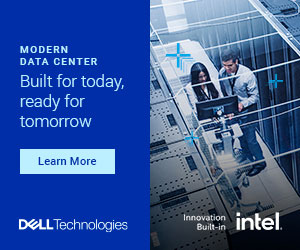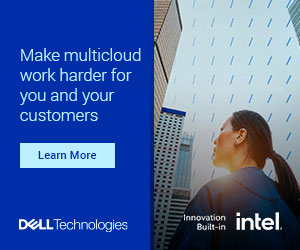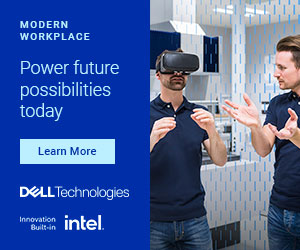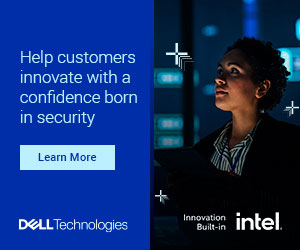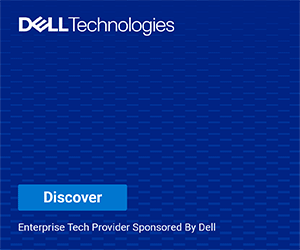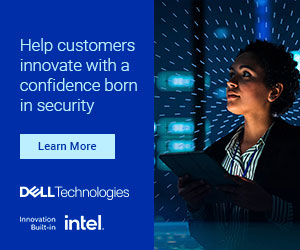A few weeks back, we published a post that reviewed the results of Breakthrough, a global survey that Dell Technologies conducted with the assistance of independent market research company, Vanson Bourne. This study surveyed 10,500 senior decision-makers, IT professionals, and employees involved in digital transformation projects across 40+ locations around the world, to understand people’s behaviors / outlooks as it relates to their propensity for digital change.
While the blog summarized the findings and made high level recommendations on how solution providers can help their customers build their next breakthrough, we are going to use this post to focus on one of the key areas that Dell believes a breakthrough can be established, and that’s with empathy.
Uncertainty and isolation during a pandemic
In 2020, companies that had been doing business in person began using a hybrid or remote solutions for their workers whenever possible to help reduce the spread of Covid-19. Even when vaccines became available, many of these companies continued to provide these flex work options.
This new work-life balance certainly presented positive opportunities for staff, but it also introduced a greater sense of uncertainty and isolation, feelings that have led to people craving a sense of normalcy and regular human contact. And this isn’t strictly an American problem. While hybrid work connects workers globally, it presents issues with connectivity (both emotionally and technologically). According to Breakthrough, 50% of respondents believe staff struggle to collaborate remotely and/or connect relationally.
There is tremendous opportunity for growth here, but for enterprises to truly succeed, they must analyze, solve, learn, and grow from the challenges and crises their employees face in this new era.
Case Study: Breaking through with empathy
Dell’s Experience Innovation Group has a vision to drive human progress vis-à-vis technology. To realize this vision, the Group makes it a point to apply empathy to human challenges and apply a responsive technology strategy that overcomes these challenges to create the best experience for end users, one that allows them to do what they do best: innovate.
This approach is counter to the idea of allowing employees to spend a small amount of time doing what they want to do. And in taking this approach, employees can be happily productive nearly all the time, with technology serving as both an enabler and multiplier, rather than a constraint or frustration.
This example underscores the importance of thoughtfully and appropriately preparing people for change. It also reveals the complexity of driving through transformation. By taking the time to fully understand the behaviors and learning preferences of their employees, a company can transition its workforce’s challenges from a source of friction to a source of fuel for innovation.
Being a leader in the new age of empathy
For managers, captains of industry, and c-level executives to meet this moment in history, they must lead with both empathy and compassion. They shouldn’t just seek to simply identify with someone’s suffering; instead, they should also seek to alleviate it.
That’s because by doing both, enterprises can protect their people through periods of uncertainty, emerging stronger and more united as a result. And when people feel empathized with, they form a connection of value, and that value empowers them to make business-savvy choices that will ultimately take the company forward.
The following is seven different ways an enterprise leader can lead with empathy:
1. Don’t ever underestimate your employees.
2. Take the time to understand your employees’ wiring; that is, their motivations, fears, triggers, and desires.
3. Leverage your employees’ motivators.
4. Provide purpose-driven work
5. Make inclusivity commonplace
6. Provide psychological safety at work
7. Address fears and build trust
Having a true understanding of the role of empathy within organizations, and the necessity to prioritize employees, should remind leaders that it is their people that remain their greatest source of value. And if their staff feel listened to and motivated, they’re more likely to seek innovative solutions that drive’s their company’s success onward and upward.
To understand more on this topic, take a listen to The Partner Connection: Empathetic Leadership: Jenn Saavedra & Cheryl Cook on Apple Podcasts. In this episode, Cheryl Cook, SVP of Global Partner Marketing has an inspiring conversation with Dell’s Chief Human Resources Office, Jenn Saavedra, about the company’s latest Breakthrough Survey. While breaking down the results, they look at what every company can learn from it, and how more empathetic leadership is now being required to drive meaningful digital transformation. Ultimately, they arrive at the following conclusion: If organizations want to contribute to a better future for all, they must recognize that business success and their people's wellbeing are inextricably linked.
For more on Breakthrough, visit here.






